
The average spend on marketing is 9.5%, going as low as 5% for manufacturers and 10% for financial services and tech. Regardless of whether you spend 2% or 10%, the question is how should you allocate it for best return? And how much to allocate to digital vs traditional marketing?
Average is not always good, but it’s a benchmark, so in this blog I break down NZ media spend and play it out in a real budget.
First, what proportion of your revenue should you spend on marketing?
The old “4% average spend on marketing” is long gone and has moved to 9.5% according to Gartner:
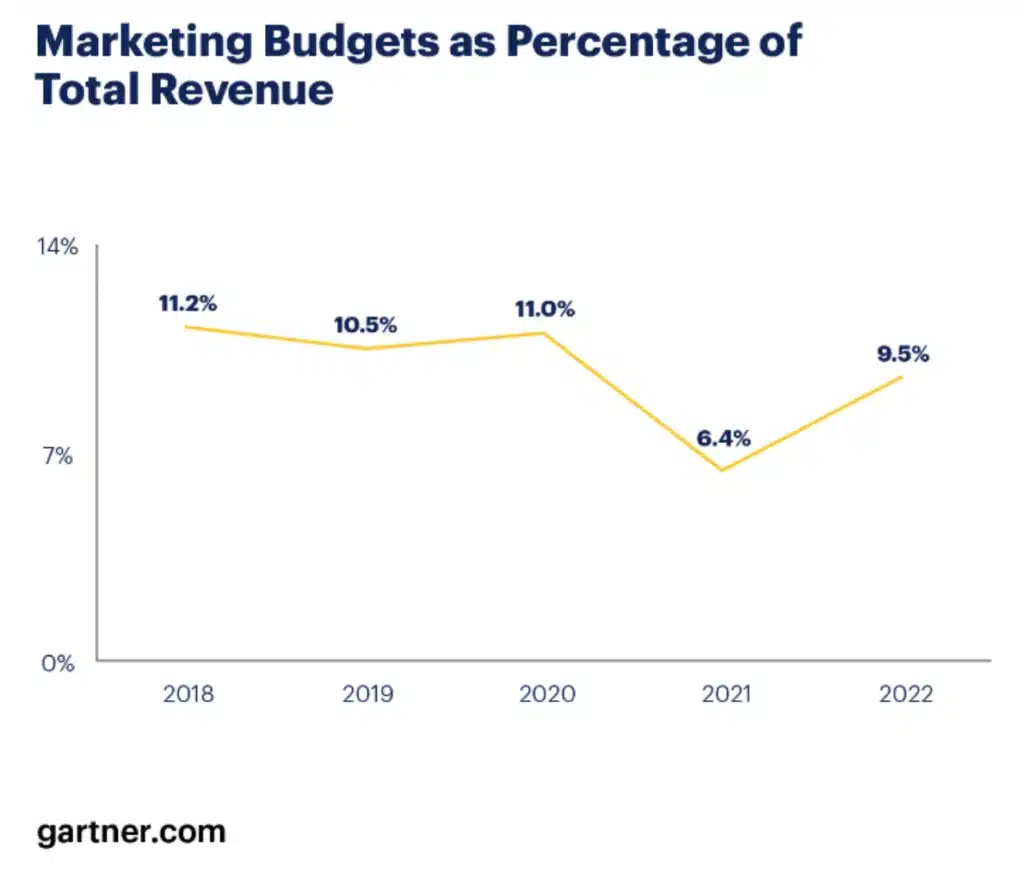
Gone are the days when manufacturers would spend 1.5-2% and the average marketing spend was 4%. Now it’s at 9.5% but it still varies by industry:
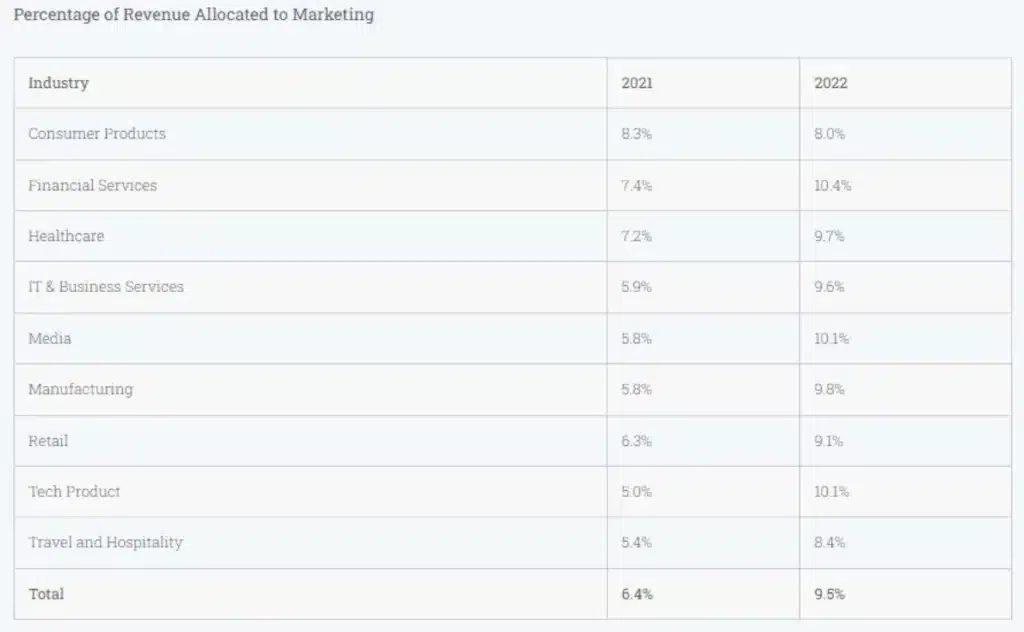
So how does this translate in NZ? We don’t have average marketing spends, but we do have media spends. Based on 20 years of media spend up to 2022, we can see the following media trends (think we turned into a “digital agency” around about 2011 after seeing this graph!):
Source: Advertising Standards Authority Industry Turnover Report cdn.asa.co.nz and Rachel’s own spreadsheet analysis over 20 years!
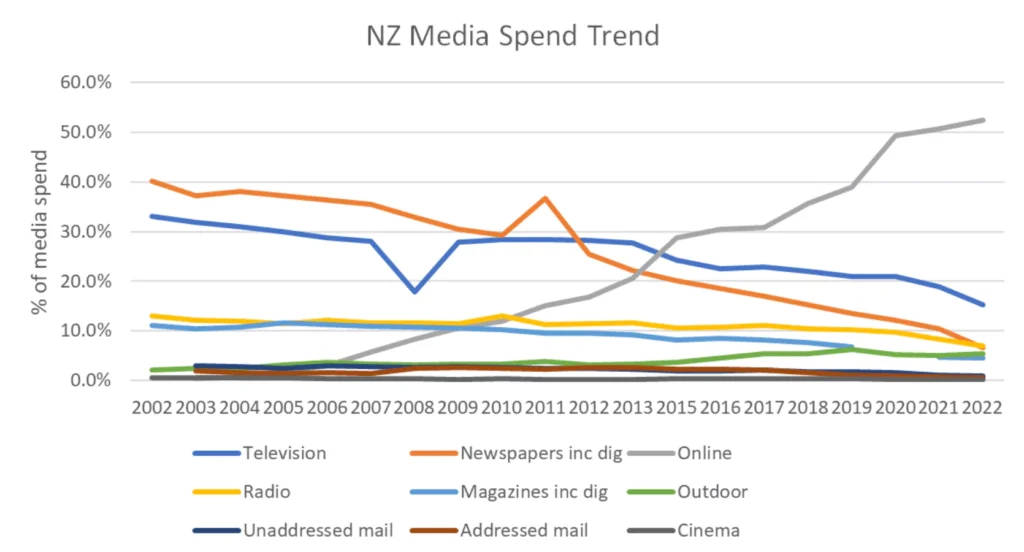
Online is the only standout, now accounting for around 52.5% of all media spend in 2022, with newspaper and television waning (the above figures for tv and magazine include digital tv and digital newspapers).
In 2022, total NZ media spend allocation was as follows (compare this to your own budget):
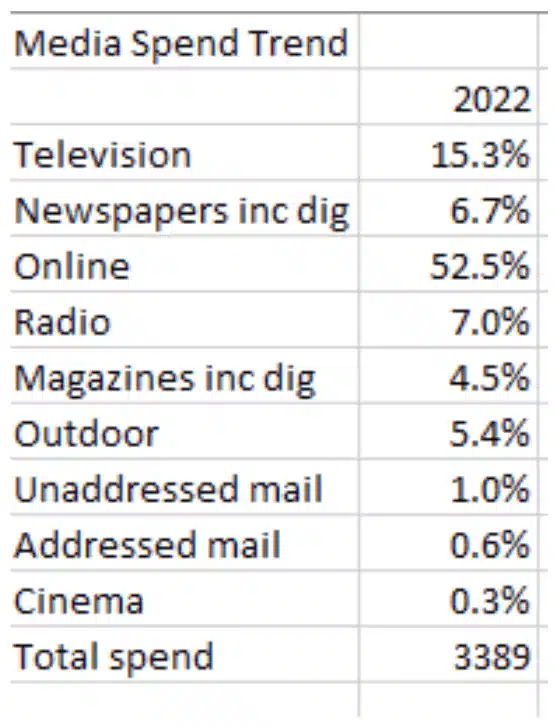
Tip: if you’re still spending 80% of your budget on radio, wow, what a rep. Best you contact a well-known digital agency in Christchurch quickly!
The leftcovers “media”, and doesn’t include web site development, search marketing, inhouse social media time, agency time, sponsorship, events, tradeshows or marketing salaries (and probably a host of other things too).
So what’s in the mysterious online 52.5% spend?
If we break down the online 52.5% component, the NZ figures excluding SEO are approximately:
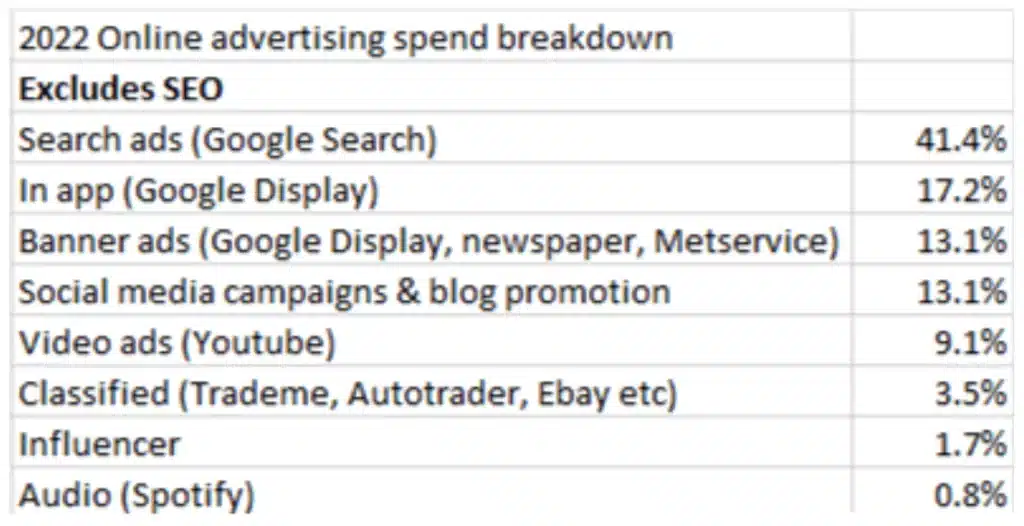
(note the elements in brackets are indications of what I suspect is included in this category – indicative only)
Approximated from https://www.statista.com/outlook/dmo/digital-advertising/new-zealand#ad-spending
When internet users around the world were asked how they typically find out about new brands and products in 2023, these were the top 10 results:
Source: https://blog.gwi.com/marketing/brand-discovery/
So, how does average ad spend pan out for a company whose turnover is say $1,651,471?
Applying a spend of 7%, we get a marketing budget of approximately $115k. Most of my clients don’t do television, so I’ve moved that to website and upped it a bit, and added in some SEO. Then applied the online percentages to the remaining with a grain of salt.
This is what it looks like:
| Potential marketing budget for $115,603 | |
| Website | $ 25,000.00 |
| Google Search/Shopping Ads | $ 21,753.00 |
| Display campaign | $ 16,000.00 |
| SEO | $ 12,000.00 |
| Social ads | $ 7,525.00 |
| Radio | $ 7,000.00 |
| Newspaper | $ 6,700.00 |
| Outdoor | $ 5,400.00 |
| Video ads | $ 4,775.00 |
| Magazine | $ 4,500.00 |
| Classified ads | $ 1,750.00 |
| Unaddressed mail | $ 1,000.00 |
| Influencers | $ 900.00 |
| Addressed mail | $ 600.00 |
| Cinema | $ 300.00 |
| Spotify | $ 400.00 |
| $ 115,603.00 | |
In practice, the split doesn’t look too bad. Video ads seems a bit high, but then the cost of video production needs to be factored in.
A decent company website could be more likely to be $35-40k+ and there’ll be edits and hosting to factor in, so perhaps the web budget allocation gets spread over 2 years.
If your target market is retirement age or older, then the digital skew might need to be reduced. Or if it’s younger, you may want to cull some newspaper.
I’d say the ratio of paid to search media could be too high (Google used to tell us to spend no more than 30% of their online ads budget on display ads, because search ads visitors are further down the readiness funnel and have a conversion rate of 3% vs display ads which are typically just 0.35-0.6%).
SEO could be higher if it’s a catchup year and lower if it’s a maintenance year.
Radio might not suit B2B or specific audiences, but could be really vital if you have retail, online sales only, around an event or if you have a big sale.
What about the all-important marketing plan? Do you need to factor in some strategic support from a marketing consultant or digital agency, or graphic designers and videographers for print marketing and social reels? Goodbye cinema and unaddressed mail?!! Hello Chat GPT? I betcha Spotify ads is the next big growth channel.
Many companies would need to factor in tradeshow attendance and stands. And inhouse salaries for marketing staff. And if you’re setting up a customer relationship management platform, that needs a chunk of love too.
So how does your marketing and advertising budget compare to the average spend stats? Is there anything you think you’ve underweighted or overweighted?
Don’t have a marketing budget?
If you don’t have a defined marketing budget, it’s a good time to get one – possibly a new financial year already? Marketing budgets are best done as part of a marketing strategy and prior to your financial year end. But it’s never too late.
Benefits of having a marketing budget:
It’s hard work doing your day job and finding time for marketing, but it’s better to be confident and have clarity, than spend $ aimlessly to feel like you’re doing something just to tick the marketing box.
It is often just as cost effective to outsource your marketing to a digital agency to prepare and manage your marketing, as they have inhouse experts. Juniors – while they have a lower hourly rate – have to learn on the job, whereas an agency has a broader skillset, and access to the latest techniques, so you get traction quickly. Plus a junior without a senior marketer to learn from could make some well-intended but crucial mistakes. Your budget is precious. Every dollar counts!
If you’ve got an enthusiastic administrator or business development person, Alexanders mentors and helps to guide marketing activities as a kind of part time, contract marketing department.
Perhaps it’s time to set up a marketing department? This is something Rachel has lots of experience in too though eventually she does herself out of a [part-time] job as the department grows.
It’s important to make sure you’re getting good bang for buck from your budget, regardless of its size. Take some time to check if it’s balanced – or if that’s beyond your pay grade, get an expert in who can suggest tweaks.
Feel free to give Rachel a bell to review your marketing spend to see if it can be redirected to get better results. 021 556 560